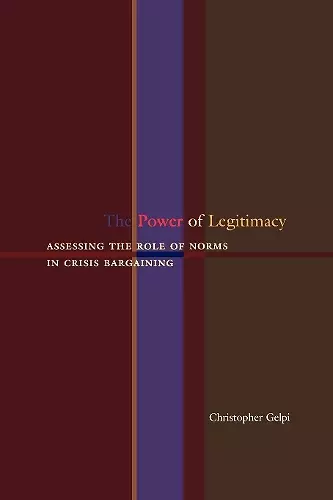The Power of Legitimacy
Assessing the Role of Norms in Crisis Bargaining
Format:Paperback
Publisher:Princeton University Press
Published:1st Apr '11
Currently unavailable, and unfortunately no date known when it will be back

Too little attention has been given to the role of norms in guiding state behavior, and Gelpi has found a creative way of conducting an empirical test of their role. His is a book I enjoyed reading--a well-constructed professional investigation with intriguing findings. It provides welcome empirical ammunition for institutionalists in their ongoing debate with realists. -- Russell Leng, Middlebury College
Presents a challenge to realist theories of crisis bargaining. This book tests the proposition that normative standards of behavior influence state actions in security-related conflicts. It examines the construction of bilateral norms as the settlements of the security-related disputes and the effects these settlements have.A major departure from mainstream security studies, this book mounts a thoughtful challenge to realist theories of crisis bargaining. It tests the proposition that normative standards of behavior influence state actions in security-related conflicts. Specifically, it examines the construction of bilateral norms as the settlements of security-related disputes and the effects these settlements have on subsequent interactions over the same issue. Drawing on institutionalist arguments about the informational impact of norms, Christopher Gelpi contends that norms act as signals that give meaning to other states' behavior in at least two important ways. First, they provide a mutually acceptable focal point for limiting both demands and concessions. Second, security norms change the context in which coercive behavior is interpreted. That is, norms can cause coercive behavior to be interpreted as punishment rather than aggression. Gelpi tests this argument against its most prominent competitor--a realist model of crisis bargaining--in three stages. First, he uses a probit analysis to perform a quantitative test on the population of 122 reinitiated international crises between 1929 and 1979. Second, he conducts detailed case studies of the Cienfuegos Submarine Conflict and the Six Day War. Finally, he conducts a second statistical analysis examining the conditions under which security norms will succeed or fail. While hypotheses derived from realist coercion theory receive only mixed support, Gelpi finds strong evidence that states can and do construct normative standards that guide their behavior in international crises.
"Too little attention has been given to the role of norms in guiding state behavior, and Gelpi has found a creative way of conducting an empirical test of their role. His is a book I enjoyed reading—a well-constructed professional investigation with intriguing findings. It provides welcome empirical ammunition for institutionalists in their ongoing debate with realists."—Russell Leng, Middlebury College
ISBN: 9780691146713
Dimensions: unknown
Weight: 312g
224 pages